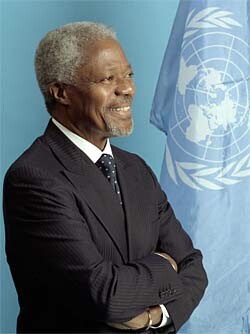The Electronic Intifada 8 June 2004

UN Secretary-General Kofi Annan. (UN)
Annan recently termed Israel’s massive lethal campaign of house destruction in Gaza “acts of collective punishment” and “grave violations of international law.” Israeli tactics included bulldozing homes with their residents inside or fleeing only moments before. It ought to follow that any person or group of people subjected to an illegal, life-threatening attack have an inherent right to self-defence using force if necessary. Every legal system in the world recognizes this, including international law.
Annan has often been very explicit in affirming this when it comes to Israel. Most recently, in a communique following the May 4 meeting of the “Quartet,” Annan stated, “While recognizing Israel’s legitimate right to self-defence in the face of terrorist attacks against its citizens, within the parameters of international humanitarian law, we call on the Government of Israel to exert maximum efforts to avoid civilian casualties.”
This concept underlies all of Annan’s statements about Israeli actions: the Secretary-General will often criticize Israel for using “excessive force,” but almost never questions Israel’s inherent right to achieve its goals through the use of violence. Since Israel always describes its actions as “self-defence,” this is effectively carte blanche. But when it comes to Palestinians, I could not find a single statement from Annan positively affirming their right to self-defence against Israeli aggression. By contrast, Annan has made countless statements critcizing, condemning and calling for a halt to Palestinian acts of violence, even when they are directed at Israeli military targets within occupied territory.
I decided I wanted clarity, so I called up Annan’s office and got a call back from Associate Spokesman Stephane Dujarric. I asked Mr. Dujarric why the Secretary General never affirms the Palestinian right to self-defense. Dujarric said he thought that Annan had publicly made such statements and promised to find them for me. I reiterated my query to Dujarric by email, in these terms:
“The Secretary-General has affirmed on several occasions that Israel has a right to defend itself with force, provided it observes international law when doing so. Does the Secretary-General believe that Palestinians also have a right to defend themselves using force, especially against the kinds of grave breaches of international law being carried out by Israel in Rafah as I write, and which the Secretary-General has specifically condemned?”
I also asked, “Other than issuing statements, what concrete steps has the SG taken, or will he take to end Israel’s attack on Palestinian refugee camps in the occupied Gaza Strip? When will he report to the Security Council as is his Charter duty?”
It took almost two weeks for Mr. Dujarric to email his response. He wasn’t able to reference any previous statements by Annan matching Israel’s “right to self-defence” with a similar Palestinian right. But Dujarric offered this formula: “International law defines the parameters within which acts of resistance and the responsibilities of the occupying power take place and it’s clear, from international law, that action from both sides should spare civilians.”
What this statement indicates is that the UN Secretary-General is fully aware that Palestinians have an inherent right to resist occupation using force, provided they do not target civilians, but neither he nor his staff are willing to state that in any direct way.
Dujarric was defensive about my second question too, responding, “You accuse [Annan] of doing nothing ‘practical.’ The Secretary-General’s daily concern is focused on finding a political solution to this conflict. In order for that to happen there must be a cessation of violence, thus his repeated calls for this to happen. More importantly, the Secretary-General is, by definition, a diplomat. His practical activities are in the diplomatic field. Although they may appear as ‘just words,’ they remain ‘practical.’”
Dujarric added, “The Secretary-General was the catalyst in the formation of the Quartet which is recognized by both parties as being representative of the international community’s efforts in the peace process.”
But this answer only amplifies the perceived criticism in my question: the so-called Quartet, made up of US, EU, UN and Russian representatives was inspired by the United States and invented for the sole purpose of sidelining the UN Security Council and General Assembly, while giving the “peace process” a veneer of international legitimacy and participation. Israel recognized the Quartet (though not without a lot of conditions) because it knows that the body is a fig leaf for American control of the process. The Palestinian Authority accepted the Quartet because it is feeble and has no alternative.
The reality is that the US has called all the shots and the Quartet has been a total failure. Its continued existence serves no other purpose than to provide a cover for its members’ unwillingness to confront Israel and hold it accountable for its flagrant violations of international law.
Despite launching the Quartet’s “road map” with much fanfare a year ago, the US abandoned the plan and replaced it with Sharon’s rapidly vanishing scheme for Gaza withdrawal. Annan’s recent efforts have focussed on trying to square the road map with Sharon’s plan, even though Sharon’s stated goal — keeping most of the West Bank — fundamentally contradicts it. The road map was worth a try, but when a policy has failed totally, and it is clear that a voluntary process will not work, there is no use persisting in it, let alone trumpeting it as an achievement.
Rather than persisting in failure and dressing it as a restless search for peace as Annan seems determined to do, he would be much more useful if he used his position to speak the truth. In pursuit of that, I wrote Mr. Dujarric that his responses to me had deftly avoided a direct answer to my original question. I have yet to hear back.
Ali Abunimah is a co-founder of The Electronic Intifada. This article first appeared in The Jordan Times on 8 June 2004.



